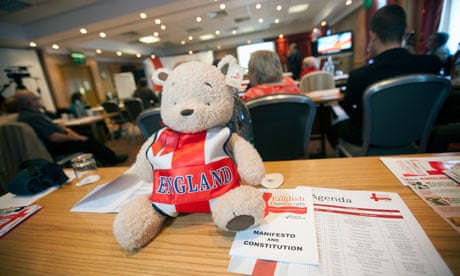The red and white of the cross of St George was omnipresent, merchandise for sale included t-shirts emblazoned with the demand: 'Justice for the 50 million' and the prizes at an evening raffle included a box set of films by Shane Meadows.
It could only be this year's annual conference of the English Democrats — a party whose handful of councillors and one elected mayor count as its achievements to date in its 10-year campaign for an English parliament.
Yet, as around 60 overwhelmingly white male delegates gathered at a hotel function room just outside Leicester at the weekend, a party long used to propping up the lower reaches of election ballots is suddenly being looked at in a new light by many beyond its self-professed membership of 3,500.
Thanks to a combination of factors, the most important of which being the implosion of the British National Party, serious political commentators now suggest the door is open for the EDs to exploit the supposedly significant gap in the electoral market for an anti-immigration, radical right party.
A trickle of disillusioned BNP activists have already defected to the party, which despite its motto of "Not Left, Not Right – Just English" is significantly more hardline on immigration than any at Westminster. They also want to pull out of the EU, ensure that the "public culture" of England should be that of the "indigenous English" and condemn "political correctness" as an "evil ideology".
Indeed, as party leader Robin Tilbrook said on Saturday, a new opportunity for the English Democrats was that "some of the people who wanted to do their honest best for our country but made the mistake of joining the BNP are now joining us and will help us become that electorally credible party."
"We need to be sure that such people are genuine converts to a more civic or cultural nationalism and that they will be an asset to our party, but we do not need to be too defensive."
The conference was addressed by one such convert, former BNP councilor Chris Beverley, who sought to address concerns that the English Democrats would be "deluged" by ex-BNP members, insisting instead that the importance of those coming over was that they tended to be "quality" activists who could make a difference.
"To me, the English Democrats are the real exciting new hope for us and there is huge potential for the party to do well," the Guardian was told by Beverley, who spoke glowingly of his new political home after spending 14 years – "my entire adult life" – in the BNP, which he likened to a cult.
Even so, observers note that Beverley remains the constituency officer of Andrew Brons, one of the BNP's two MEPs, who recently challenged Nick Griffin for the leadership of that party.
In addition, another key figure who is awaiting a decision on his application to join the English Democrats is Eddy Butler, the BNP's former national organiser, an architect of past local election successes and a major rival to Griffin's leadership within the divided party.
"People like Butler and Beverley, who is important because he can run and win elections, have been flirting with the English Democrats as an alternative vehicle because in their minds, and in the minds of political commentators, there is significant potential in British politics for a radical rightwing party," according to Matthew Goodwin, author of New British Fascism: Rise of the BNP.
While Goodwin doesn't count English nationalism by itself as a vote winner, he suggests that a new radical right force could grow by tapping into public anxiety over immigration, law and order and hostility towards established parties.
"The test for the English Democrats will come if more people shift over. There might be awkward questions in the party among those who want it to remain BNP-free and those who would want to open up the door to all of these renegades on the right, much like what the NF was in the late 1960s. If it really starts to suck in BNP members and organisers, then you have something that is potentially very interesting - because there is unquestionably still a great deal of potential for a radical anti-establishment rightwing party."
